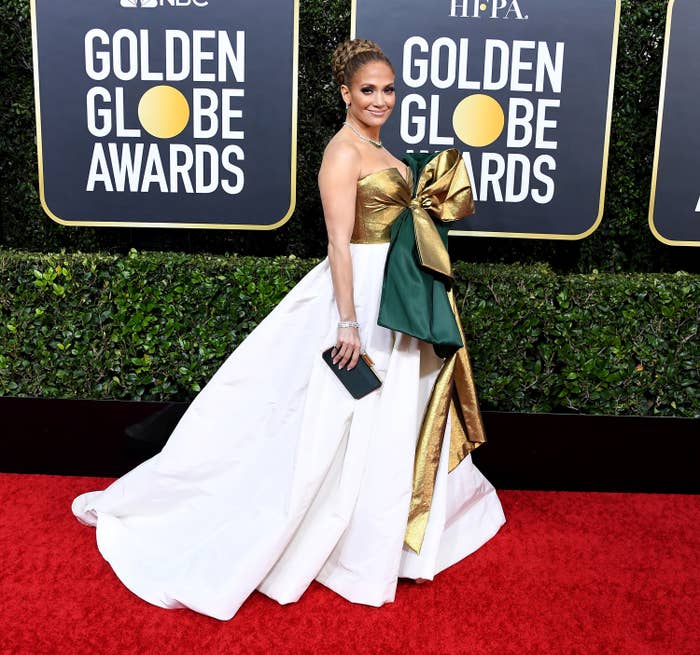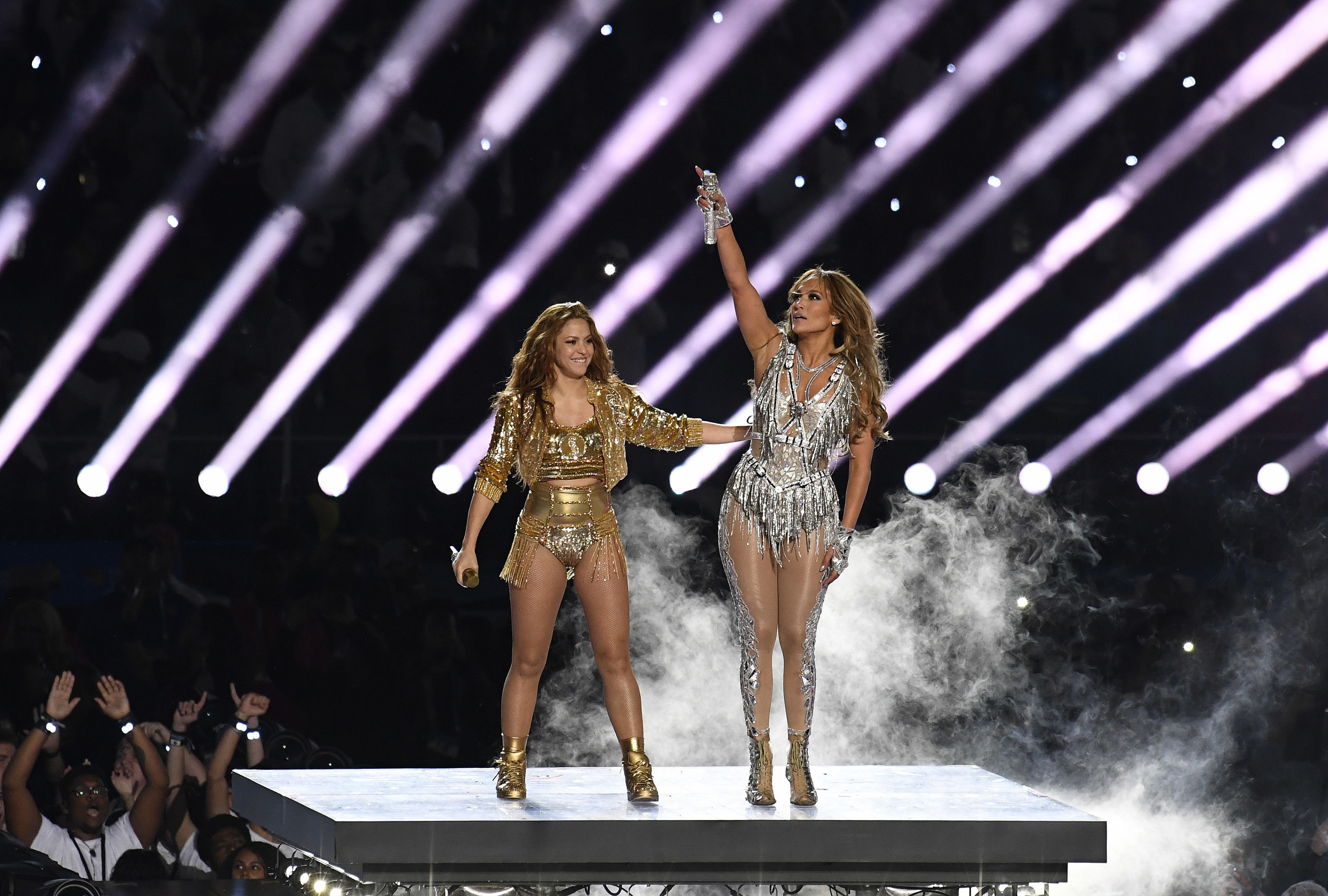
“I want something real. I want something that’s gonna make a statement,” Jennifer Lopez says to an NFL producer in her new Netflix documentary, Halftime. She’s responding to executives trying to cut out scenes of children in cages from her Super Bowl show, and she’s fed up. “I’m trying to give you something with substance; not just us out there shaking our fucking asses and fucking belly dancing,” she continues.
It’s a markedly different tone than the one we’re used to seeing from the smiling reality show judge, music video face-giver, and movie star. She was the first Latina paid $1 million for a movie role with 1997’s Selena and then broke records when her album and movie — J.Lo and The Wedding Planner — shot to No. 1 on the charts the same week of 2001. She’s done American Idol, Vegas residencies, dancing competitions, and scripted network TV shows.
But now she wants to be taken seriously. She’s talked about being seen as a lightweight since her Oscar snub for her role in the 2019 movie Hustlers and about how her crowd-pleasing work hasn’t always gotten critical acclaim by way of Grammys or Academy Awards. “It’s just 20, 25 years of people going, ‘Well, she’s not that great. She’s pretty and she makes cute music, but it’s not really this and that,’” she told Rolling Stone last year. “And I always acted like, ‘Yeah, I’m good. I’m fine. I’m OK.’ But it hurts to not be included. … There is an inner circle, like, ‘We are the great artists.’ And then there’s the pop artists.”
Recent documentaries about white women celebrities in the ’90s and aughts have accused the media of mistreating these stars. Lopez’s new film positions her in a similar — though much rarer — light as a Latina. It might seem like awkward framing from the woman whose lean-in mentality has gotten her into every door in Hollywood and beyond. But the documentary delivers an interesting journey down her decadeslong career.

Halftime intercuts Lopez’s early years, both before stardom and her earlier eras, with a slice-of-life look at the year leading up to the making of and reception of Hustlers and her Super Bowl performance. In typical Lopez fashion, there are full-glam confessionals where she sits in a director’s chair and reflects on her life as images flash onscreen.
She talks about getting her drive to succeed from her parents, especially her strong mother, Lupe. Lopez shares how she felt undervalued in her family growing up in the Bronx, where she was anointed as a dancer-athlete while her sisters were considered the family singer and the smart one.
Her mom’s love of musicals trickled down to Lopez, especially West Side Story, and the movie’s star, Rita Moreno, became her role model for her own career: an entertainer who would dance, sing, and act. She quickly segued from a dancing Fly Girl on the comedy show In Living Color to Selena, and then finally to Hollywood A-lister and major pop star.
Recent documentaries about white women celebrities in the ‘90s and aughts have accused the media of mistreating these stars. Lopez’s new film positions her in a similar — though much rarer — light as a Latina.
But as she gained power and celebrity, there were persistent backlashes and jokes about her ethnicity and body. The film includes scenes of the kind of “humor” trotted out about her in late-night monologues and South Park even at the peak of her fame. There were clichéd Lopez-as-a-cleaning-lady bits, gross-out “taco-flavored” kiss jokes, and intrusive questions about her butt. There were also headlines about “diva” tendencies.
Lopez doesn’t talk about whether she enjoyed or fed into the unrelenting tabloid attention, even though from the outside she seemed to be having fun managing it. (Ben Affleck is trotted out for one brief moment where he says that Lopez told him that as a Latina woman she expected the backlash and double standards regarding her work and image.) She also doesn’t say much about what her work means to her in personal terms, beyond clichés about wanting to move people and writing songs about love, not politics. Then again, at least Lopez is honest about her aims (one of her albums is simply called Love?).
Still, for someone who’s stayed away from politics, she’s always oddly, and mesmerizingly, polarizing. There was that infamous 1998 Movieline magazine interview where she called Cameron Diaz "a lucky model who's been given a lot of opportunities” and said she couldn’t remember Gwyneth Paltrow’s movies. And before the documentary came out, Lopez sparked one of the most heated battles in the history of Latinx Twitter when she seemed to shade Shakira, based on a teaser from the documentary where she says the NFL’s demand for a shared Super Bowl performance was “the worst idea ever.”

I assumed the viral clip was probably misconstrued, but it’s kind of not. In the documentary, Lopez seemed to be really annoyed about sharing the stage — not because of Shakira, but because of the NFL not expanding the time to accommodate two performers. As the two stars plan for the show, though, she does hilariously seem to treat Shakira as something of an afterthought. She tells manager Benny Medina that she proposed they sing Bruce Springsteen’s “Born in the U.S.A.,” but Shakira pointed out she…wasn’t born in the USA. Producers could have edited the moment differently to flatter Lopez and appear more blandly generous, but they didn’t. It’s telling.
Lopez is openly vulnerable about her desire and disappointment about the Oscars snub.
The filmmaker, Amanda Micheli, also leaves in comments from the NFL’s halftime show director complaining about “identity politics,” and includes headlines about the superficiality of the NFL’s support for anti-racist efforts given that team owners support Trump. Lopez revels in including the Puerto Rican flag onstage with her and gets teary-eyed in rehearsals talking about the treatment of Latinx people in the US. At the same time, the documentary flattens the politics of the moment by completely glossing over the fact that the NFL turned to the two Latinas to obscure the fact that Black performers, including Rihanna, in solidarity with Colin Kaepernick that year, refused to perform.
But true to the Lopez ethos, politics aren’t the point of the documentary. Or at least not those kinds of politics. It’s really about the industry politics surrounding Lopez, including the reception of Hustlers. The documentary shows her getting her hopes up with the press reaction to the movie and even reads a flattering article on camera. “Frankly it’s thrilling to see a criminally underrated performer” — her voice catches in her throat — “get her due from prestige film outlets.”
The documentary includes footage of her dejected face as she enters the hotel room where her team awaits her after she loses the Golden Globe. Most people would just say they're “happy to be nominated for the Globes,” but Lopez is openly vulnerable about her desire and disappointment about the Oscars snub. “The truth is I really started to think I was gonna get nominated,” she says to the camera. And after she’s overlooked, we even get a generous camera pan of a thoughtful New York Times piece that explained why her unsentimentally sexual character, Ramona, might not have resonated with the academy’s voters.
The final scenes of the documentary are somewhat jarring, like an infomercial for Lopez herself, as we see her at a philanthropic event where she’s trying to get corporate investment in small businesses for Black and brown women.
In the end, it’s not so much that Halftime is a watchable film because Lopez is especially sympathetic as a multimillionaire A-lister underdog. But it’s more compelling than most celebrity self-portraits because she’s open about saying she feels like one. ●
